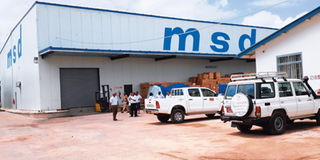How officials at MSD inflated costs of equipment

What you need to know:
- Reading out some of the inflated prices of equipment he gave an example of a clinical chemistry analyzer which costs Sh1.3 million but the procurement office bought the same machine at Sh6.7 million.
Arusha. Prime Minister Kassim Majaliwa has on Thursday, May 5 revealed how the Medical Stores Department’s (MSD) procurement department failed in its obligation by inflating costs of various equipment.
Speaking at the annual Public Procurement week, the Prime Minister said the misappropriation of public funds at MSD was gross and unimaginable.
Reading out some of the inflated prices of equipment he gave an example of a clinical chemistry analyzer which costs Sh1.3 million but the procurement office bought the same machine at Sh6.7 million.
The department was supposed to procure a body chemistry analyzer with a bigger capacity which cost Sh10.5 million but instead they paid Sh49 million for the same machine.
A glucose analysis which costs Sh7,956 was bought at Sh58,500 whereas a hematology machine which costs Sh20.8 million was purchased at Sh117 million.
According to the Premier, a hematology machine which costs Sh37 million was purchased by MSD at an inflated cost of Sh149 million.
“In whose interest was this person acting, are we sure that he did not benefit from these transactions?” questioned the PM.
The Premier who looked very displeased by the actions of the procurement officers at MSD ordered the umbrella body of public procurement officers to quickly investigate.
“Lets meet at MSD on Monday at 1000am, if possible I will come the IGP Sirro and PCCB’s Hamdun,” said the PM.
The premier said the government would not tolerate the open fraud and squandering of public resources at MSD and summoned the MSD officials to his office on Monday.
“They will explain why the items were purchased at such unimaginable cost?” he said, directing the relevant anti-graft agencies to investigate the matter.
Mr Majaliwa hinted at the possibility of the government purchasing vehicles directly from the manufacturers abroad in order to cut down costs.
The current purchasing system through the agents inflated the cost of the vehicles, citing the Toyota brands which form the bulk of the government vehicles by 90 percent.
“We stand to save a lot of money by buying them directly from the Toyota company. We should start exploring this option,” he told procurement experts at the packed AICC’s Simba hall.
The premier later turned his furry to another government body, the Tanzania Electrical and Mechanical Service Agency (Temesa) for failure to deliver.
The agency is, among others, tasked to undertake effective maintenance of government -owned vehicles, motorcycles and plants but the PM faulted its performance.
He called on the local governments to ensure their councillors were well sensitized in the procurement procedures in order to end persistent conflicts with the government officials.
The government bodies responsible for the procurement sector were also urged to work collaboratively and go electronic in order to enhance efficiency and cost-cutting.
These are the Public Procurement Regulatory Authority (PPRA) and the Procurement and Supplies Professionals and Technicians Board (PSPTB).
Others are the Public Procurement Appeals Authority (PPAP), the Government Procurement Services Agency (GPSA) and the Tanzania National e-Procurement System (TANeps), among others.
Earlier the conference being held alongside an exhibition was told that the government saved billions of shillings through e-procurement systems.
These include Sh18.6 billion for electronic purchase of vehicles Sh9.6 billion in clearing and forwarding (2019-2021) and Sh88 billion for inspection during 2015 to 2020.
By last month, April, about 700 government institutions had been connected to the system with 28,340 tenders worth Sh23 trillion processed through e-procurement systems.





